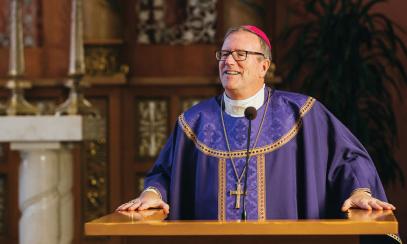Resisting an Aggressive Secularism
It was with barely concealed delight that “Chicago Sun-Times” columnist Neil Steinberg conveyed the findings of the recent Pew Forum survey that the “nones,” those who claim no particular religious affiliation, are sharply on the rise in America. Moreover, he crowed, the survey revealed that a disproportionate number of young people placed themselves firmly in the “none” camp, thus indicating that religion’s decline would only accelerate in the years to come. Taking these findings as a starting point, Steinberg then delivered himself of an anti-religion screed that was, even for him, remarkable in its vitriol and lack of nuance.
Central to Steinberg’s argument is that the “virus” of freedom, which the founding fathers planted in the body politic long ago, has spread to the point that it now threatens religion itself. Finally, he says, people have the courage to throw off the shackles of “arbitrary rules and arcane liturgies” and join the society of free-thinking moderns. There are two fundamental problems here. First, like so many of his secularist colleagues, Steinberg conveniently forgets that the political liberty he rightly praises is predicated inescapably upon religious assumptions. The keen sense that each human being is the subject of rights and dignity is grounded in the antecedent conviction that that dignity and those rights come from God and hence have an absolute sanction. As Thomas Jefferson put it rather memorably, “All men are created equal…and are endowed by their Creator with certain inalienable rights; among these are life, liberty, and the pursuit of happiness.” If you want to see what happens to freedom and human rights when God is removed from the picture, consult both ancient aristocratic societies and modern totalitarian regimes. Steinberg exults that the “freedom virus” conduced toward the liberation of blacks in America, but he seems utterly to have forgotten that both the abolitionist movement in the nineteenth century and the civil rights movement in the twentieth were led by passionately believing Christians, who advocated for liberty precisely because of their religious beliefs, not despite them.
The second problem is that Steinberg assumes that his position—modern, secularist liberalism—is not itself sectarian, peculiar, and indeed marked by its own “arbitrary rules and arcane liturgies.” This is a difficulty that any cultural analyst tends to have, but modern liberals seem especially susceptible to it, namely, the assumption that their own culture isn't really a culture at all but just “the way things are supposed to be.” The form of life that came up out of the European Enlightenment of the 18th century—empirical, scientific, subjectivist, rationalist, anti-traditionalist—strikes modern secularists as just identical to sweet reason and hence they feel that anyone who fails to conform to it is operating “irrationally” or is in thrall to some strange “superstition.” Jurgen Habermas, one of the leading philosophers in the world, advocates (admittedly at a higher level of sophistication) the position staked out by Steinberg. He argues, accordingly, that the only people who should be allowed around the table of political discussion in contemporary societies are those who accept the presumptions of the Enlightenment. Thus religious people, representing some of the most ancient intellectual traditions in the West and relying on the work of such geniuses as St. Paul, St. Augustine, St. Thomas Aquinas, John Henry Newman, John Wesley, and G.K. Chesterton, would not be allowed Habermas’s table. Nor for that matter would William Lloyd Garrison, Martin Luther King, Desmond Tutu, or Mohandas Gandhi. One wonders how neither Habermas nor Steinberg can see that the Enlightenment view, though obviously valuable, is hardly identical to Reason tout court.
Utterly congruent with this idolatry of the Enlightenment is Steinberg’s sneering relegation of religion to the arena of hobbies and harmless avocations: “Life is a long time…and you have to fill it somehow, and adhering to the various tenets of Lutheranism or Baptism or Seventh Day Adventism…is not inherently a worse use of your time than, oh, knitting colorful afghans or playing John Madden Football or anything else.” Though the Christian tradition essentially created the culture of the West, though it invented the university system, and though it gave rise to Dante’s Divine Comedy, Aquinas’s Summa Theologiae, Chartres Cathedral, the Sistine Chapel ceiling, Bach’s cantatas, and the poetry of Gerard Manley Hopkins and T.S. Eliot, it is, according to Mr. Steinberg, the intellectual equivalent of knitting an afghan! Trust me when I tell you that whatever matrix of thought produced that conclusion ain’t identical to “sweet reason.” It is in fact something peculiar and sectarian indeed.
The relegation of religion to the private realm is, of course, an aggressive move, for it is designed to exclude religious people from the political and cultural conversation. Basically, Habermas and Steinberg and their fellows are saying to religious believers, “While you play at your little hobbies, we rationalists will take care of serious matters.” In the face of this act of violence, believers should engage in non-violent resistance, entering the public arena with the language of the Bible and the great tradition on their lips, as did our forebears Thomas Jefferson, Abraham Lincoln, John F. Kennedy, and Martin Luther King. Pace the secular ideologues, it is altogether possible for religious people—especially those who believe in the divine Logos—to have a logical conversation.
Father Robert Barron is the founder of the global ministry, Word on Fire, and the Rector/President of Mundelein Seminary. He is the creator of the documentary series, "Catholicism," airing on PBS stations, CatholicTV and EWTN. The documentary has been awarded an esteemed Christopher for excellence. Learn more about the series at www.WordonFire.org



